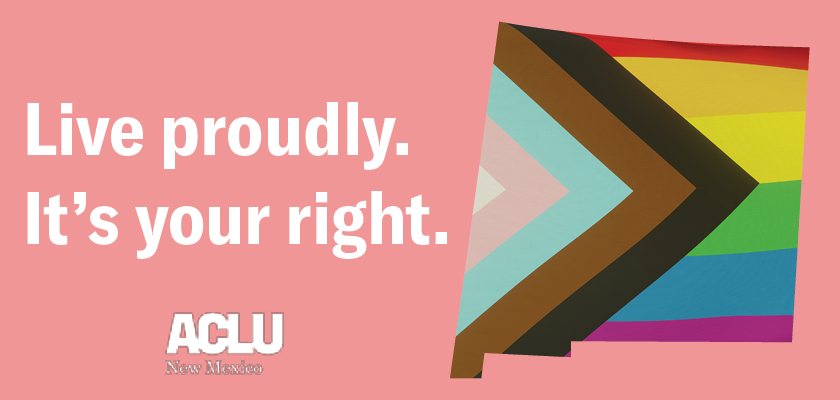
Every year, New Mexicans face discrimination when going about their daily lives, whether it’s at their place of employment, school, or a convenience store. This year alone, we sued on behalf of a transgender woman who was fired by her employer because of her gender identity; a Muslim man who was harassed while praying at his son’s grave because of his religion; and a Native American student who was called racist and derogatory names by her teacher. This kind of discrimination is illegal under the New Mexico Human Rights Act.
Did you find your way here from our billboards around town? We're happy you're here. Scroll down for more information about how the New Mexico Human Rights Act protects you and learn what you can do if you have been a target of discriminatory treatment.
The New Mexico Human Rights Act protects people from discrimination on the basis of race, age, religion, national origin, ancestry, sex, sexual orientation, gender identity, childbirth or a condition related to pregnancy or childbirth, physical or mental handicap or serious medical condition, and spousal affiliation in the areas of employment, public accommodation, housing, and credit.
It is illegal for employers to harass, fire, or refuse to hire people on the basis of the above protected categories.
The Act also requires employers to make reasonable accommodations for a person’s “physical or mental handicap or serious medical condition.” Employers specifically have to make reasonable accommodation for employees or job applicants with needs arising from “pregnancy, childbirth or a condition related to pregnancy or childbirth.” Employers are not allowed to force people with pregnancy-related conditions to take leave unless they want to.
It is unlawful for any person in any public accommodation to discriminate against any person because of their identity. Public accommodations are considered to be spaces, whether owned privately or publicly, that are open to the public. This includes but is not limited to: restaurants, hotels, pharmacies, sports arenas, movie theatres, bars, gyms, medical offices, public restrooms, and non-brick and mortar businesses, including photographers.
It is unlawful for any person to discriminate in selling, renting, leasing, and subleasing, on the basis of the protected categories, as long as any “physical or mental handicap is unrelated to a person’s ability to acquire or rent and maintain particular real property or housing accommodation.”
It is unlawful for anyone who is providing credit (mortgages, credit cards, loans) to discriminate on the basis of the protected categories.

If you believe you have been discriminated against in one of the above ways, you can file a complaint directly with the New Mexico Human Rights Bureau within 300 days of the most recent act of discrimination. You can also notify the ACLU of New Mexico.
File a complaint with the New Mexico Human Rights Bureau here: https://www.dws.state.nm.us/Human-Rights-Information
If you file the form, there will be an investigation.
If the investigation goes forward, the investigator decides if there is probable cause or no probable cause.
At any point in the investigation, you can decide you don’t want to go through this process and want to just file a lawsuit in court.